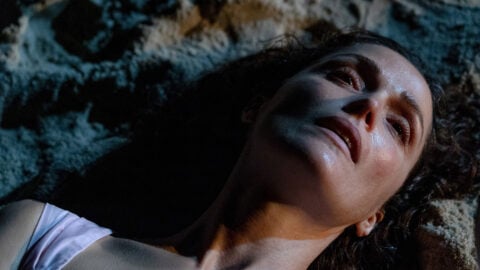Cannes Diary #3

David Cronenberg places Robert Pattinson in a limousine once again. In 2012’s Cosmopolis the actor appeared as a passenger, but for the Canadian auteur’s Cannes competition entry, Maps to the Stars, he’s been moved to the front seat.
Pattinson plays a limo driver in Los Angeles, shuttling famous people around town, while hoping to break into the business with his own script and considering converting to Scientology as a career move. Pattinson’s character is modeled after its writer, Bruce Wagner, who, back in the Nineties, before achieving fame as an author, was himself a driver for famous people, working on a screenplay about his exploits in Hollywood.
At the Cannes midpoint, critics and industry types have been buzzing about Cronenberg’s ghost story that features a fucked-up Hollywood family. Dad (John Cusack) is a self-help guru and his wife is managing their monster child-actor son, while their daughter (Mia Wasikowska)—just out of a sanitarium—is battling internal demons and has just started working as an assistant to a fading actress (Julianne Moore).
Moore’s performance has been the object of attention here today. As Havana Segrand, she delivers an on-screen rant from a toilet seat, drops inside jokes about Harvey Weinstein, and in a limo sex scene lures Pattinson with the immediately quotable line, “Do you wanna fill my holes?” Havana is desperate to join the cast of an indie remake in a role originated by her mother and one she’s certain will earn her a Supporting Actress Oscar nomination.

Cannes audiences laughed throughout Maps to the Stars. But after the screening, journalists wondered whether their response was appropriate given that most of the humor in Cronenberg movies is typically found deeper below the surface.
“I think all of my movies are funny, and I think this one is no exception,” Cronenberg said dryly during today’s press conference. “Every movie is of course different and with Bruce’s script there’s a voice that is unique. I was really serving the script and his version of L.A. and humanity in general. So, blame him. It is not my fault.”
Cronenberg, who filmed in the U.S. for the first time in his career, said he ultimately embraced his audience’s early reactions. “You’ve gotta admit there are some laughs in the movie,” he continued. And then pointing to Julianne Moore, added, “She thought she was making a comedy.”
“I think everything is funny,” Moore elaborated. “Tragedy is funny. Life is funny. There is something funny and sad about people consistently missing the mark. That’s what the while movie is about, looking out rather than looking within.”
She and Cronenberg rejected the notion that their new film casts the film industry as repulsive. “As a card-carrying existentialist, I have to say these people are desperate to exist,” noted Cronenberg. “They are desperate to assert their existence. As an actress who is being discarded by the industry [Julianne’s character is] terrified she will in essence cease to exist. It will be a living death and that’s where the desperation comes from.”
The two also agreed that the film’s characters could just as easily inhabit any number of industries. “It’s not only about Hollywood and the movie business,” Cronenberg explained. “You could set it in any place where people are desperate, greedy, fearful. You could really set it anywhere and have that same tone and ring of truth. To see it only as an attack on Hollywood and the movie biz is shortchanging the movie.”







